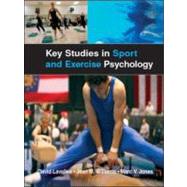
| Dedication | p. ix |
| Preface | p. x |
| Acknowledgements | p. xii |
| Author biographies | p. xiv |
| Personality and motivation | p. 1 |
| Personality | p. 3 |
| Psychologic characterization of the elite distance runner. Annals of the New York Academy of Science, 301, 382-403. | |
| Anxiety | p. 24 |
| State anxiety among successful and unsuccessful competitors who differ in competitive trait anxiety. Research Quarterly, 47, 698-708. | |
| Aggression | p. 40 |
| The dark side of self- and social perception: Black uniforms and aggression in professional sports. Journal of Personality and Social Psychology, 54, 74-85. | |
| Achievement motivation | p. 59 |
| Children's achievement goals and beliefs about success in sport. British Journal of Educational Psychology, 62, 313-23. | |
| Exercise adherence | p. 74 |
| Self-motivation and adherence to habitual physical activity. Journal of Applied Social Psychology, 10, 115-32. | |
| Self-efficacy | p. 93 |
| Self-efficacy and the stages of exercise behavior change. Research Quarterly for Exercise and Sport, 63, 60-6. | |
| Social processes | p. 111 |
| Social facilitation | p. 113 |
| The dynamogenic factors in pacemaking and competition. American Journal of Psychology, 9, 507-33. | |
| Group dynamics | p. 131 |
| The influence of the group and its cohesiveness on perception of group-related variables. Journal of Sport & Exercise Psychology, 15,245-66. | |
| Leadership | p. 147 |
| Scrutinizing the skipper: A study of Leadership behaviors in the dugout. Journal of Applied Psychology, 64, 391-400. | |
| Psychological characteristics and skills | p. 161 |
| Characteristics and skills of elite athletes | p. 163 |
| Psychology of the elite athlete: An exploratory study. Cognitive Therapy and Research, 1,135-41. | |
| Coping with stress | p. 174 |
| Coping strategies used by more versus less successful U.S. Olympic wrestlers. Research Quarterly for Exercise and Sport, 64, 83-93. | |
| Cognitive strategies | p. 191 |
| The effect of cognitive strategies on the free throw shooting performance of young athletes. The Sport Psychologist, 3,95-104. | |
| Attention and concentration | p. 204 |
| The effectof attentional focus on performance of an endurance task. International Journal of Sport Psychology, 16,217-23. | |
| Imagery | p. 215 |
| The effects of internal and external imagery on muscular and ocular concomitants. Journal of Sport Psychology, 4,379-87. | |
| Goal-setting | p. 229 |
| Effects of goal specificity, goal difficulty, and information feedback on endurance performance. Journal of Sport Psychology, 9,43-54. | |
| Personal growth and psychological well-being | p. 243 |
| Character development and sportsmanship | p. 245 |
| The effects of sport experience in the development of social character: An exploratory study. Journal of Sport Psychology, 3,114-22. | |
| Exercise and psychological well-being | p. 258 |
| Effect of exercise on depression. In K. B. Pandolf & J. O. Holloszy (eds), Exercise and Sport Science Reviews, 18,379-415. Baltimore, MD: William & Wilkins | |
| Eating disorders | p. 285 |
| Attitudes toward eating and body weight in different groups of female adolescent athletes. International Journal of Eating Disorders, 7, 749-57. | |
| Substance abuse | p. 298 |
| Self-reported use of anabolic-androgenic steroids by elite power-lifters. The Physician and Sports Medicine, 16,91-4, 96-8. | |
| Injury | p. 311 |
| Conjunctive moderator variables in vulnerability and resiliency research: Life stress, social support and coping skills and adolescent sport injuries. Journal of Personality and Social Psychology, 58,360-9. | |
| Burnout | p. 326 |
| Burnoutin competitive junior tennis players: II. Qualitative analysis. The Sport Psychologist, 10,341-66. | |
| Professional practice and ethics | p. 349 |
| Professional practice of applied sportpsychology | p. 351 |
| An evaluation of U.S. Olympic sport psychology consultant effectiveness. The Sport Psychologist, 5, 111-27. | |
| Ethics | p. 370 |
| Ethical beliefs and behaviors in applied sport psychology: The AAASP ethics survey. Journal of Applied Sport Psychology, 6,135-51 | |
| Index | p. 389 |
| Table of Contents provided by Ingram. All Rights Reserved. |
The New copy of this book will include any supplemental materials advertised. Please check the title of the book to determine if it should include any access cards, study guides, lab manuals, CDs, etc.
The Used, Rental and eBook copies of this book are not guaranteed to include any supplemental materials. Typically, only the book itself is included. This is true even if the title states it includes any access cards, study guides, lab manuals, CDs, etc.